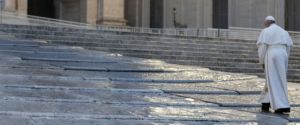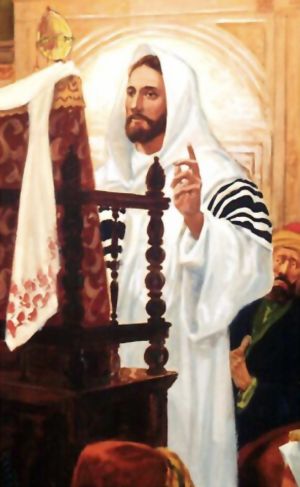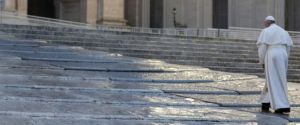
don Giuseppe Nespeca
Giuseppe Nespeca è architetto e sacerdote. Cultore della Sacra scrittura è autore della raccolta "Due Fuochi due Vie - Religione e Fede, Vangeli e Tao"; coautore del libro "Dialogo e Solstizio".
The Lord wants new people, who listen
(Mk 3:31-35)
In the life of one who is challenged by the relationship of Faith, in order to become consanguineous with the Father according to the Spirit, it is essential to become a disciple, not to "stand outside" (vv.31-32).
We are called to Perceive, in the profound sense of Listening - not so much materially "seeing" in a direct way, and then "convincing" the Lord.
It is necessary to perceive and grasp: a path to encounter one's own deep layers of being, the truth of inclinations, and of life.
It is decisive to welcome a satiating Word, which becomes language and culture, which has creative power: given to the ears and discovered within. Captured in personal history and reality, and transmitted again.
To turn away from such a founding Word and Eros is to detach oneself from oneself, to disperse into rivulets that do not belong to us, to plunge into emptiness ['emptiness' not understood as a deep energetic state, which prepares new developments].
Paradoxically, both our Freedom and the Salvation of the world are the result of Obedience - but not external, or others'.
Rather, it is tuning in to the part of the Logos within us that is blossoming; truly 'perfect'. No conditioning models.
No a priori correction, no forcing according to prejudice: rather, an eternal Metamorphosis - accompanied by the Word, mysteriously leading from Exodus to Exodus.
No configured "cultural" expectation would lead to full communion with the great divine spark and fullness in each and all.
Realisation of the Kingdom and every day - even outside of time.
To know Christ, it is not enough to look at him outwardly and get caught up in sympathy or religious emotion.
It is the Listening, the habit of life, the involvement, that establish and intimate bonds of authentic harmony with the Master.
A new family is created around Jesus, with bonds of spiritual kinship that are stronger than what the narrow bonds of kinship offered.
The Lord wants other people, born precisely from Perception-presence.
The union is no longer reserved and exclusive; it becomes accessible to anyone and in whatever condition they find themselves - even if they are outwardly "blind", unable to see what is at hand.
Everyone is Church, the Father's House, and thus can realise God's Dream of dwelling with men and walking beside them.
He dwells among us and in us. In his Word, with no more "distance".
In this way, all our actions must tend towards this goal: to form the Temple of God, his household, the Body of the living Christ.
To reach this accomplished goal, an essential means is to host the Vocation that transforms us, a foundation much deeper than any bond or emotion.
Indispensable is not an (initial) experience of enthusiasm, but rather the hosting of the Call that interprets life and becomes a mentality, a dynamism within that guides and flows into peripheral paths.
In ancient Israel, the basis of social coexistence was the large family. Clans and communities were a guarantee of protection of both particular hearths and people.
That bond of real solidarity ensured possession of the land - which gave a sense of freedom - and was the vehicle of cultural transmission, of the way of feeling as a people, and of spirituality itself.
Defending the coexistence that guaranteed global identity was the same as defending the First Covenant.
But in Palestine at the time of Jesus, the life of the clan and the life of the community - broader - were undergoing a decline.
Excessive taxes to be paid to collaborating governments and the Temple, the inevitable rise of the classes who had to sell themselves as slaves for debt, perhaps the more individualistic mentality of the Hellenistic world, imperial threats, and the obligation to welcome, forage, and harbour Roman troops [who often took advantage of even the weakest members of the clan], accentuated the problems of survival.
In addition to this, the severity of purity regulations was a further factor of marginalisation, alongside the growing idea - typical of religions - that there was a link between a heavenly curse and a condition of misery.
The material and protective concerns of the individual family accentuated the detachment from collective moments.
Jesus wanted to expand again the narrow limits of the small hearth brotherhood, and enlarge them to the great household of the Kingdom of God.
A comparison with the parallel passages of the episode shows that Jesus had problems with his natural relatives.
They tended to reabsorb him within the parameters of tradition, for fear of retaliation and because they considered him extremist (perhaps unbalanced).
The Risen One broadens the idea of family and challenges the constraints that distance us from our identity-character, and mission-whether it is the impediments placed by his own, by Peter, by the disciples, by powerful people, or leaders of the official religion.
As mentioned above, at a time of political subjugation and rigid legalistic religious ideology, the core values of clan and community were weakening due to the situation of social and economic collapse.
The situation of extrinsic control - social and conscience slavery - prevented people from uniting and sharing, forcing them to confine themselves to individual, exclusive dynastic problems.
[Situation of Jesus' time, yet not entirely alien to us, even from the point of view of certain 'charisms' configured in too much detail, and the realities already established on the ground].
Even during the civil war in the late 1960s, the core values of Roman society were weakening.
For the new realm to manifest itself, it was necessary for the idea of coexistence to go beyond the narrow limits of the individual and the tiny household - also from a cultural point of view.
There was a need for a stimulus that opened to community life - understood according to the spirit of the Beatitudes, for a conviviality of differences; even in real, even raw cohabitation.
Even today in the time of global crisis, the goal is an existence no longer disfigured by retreats, nor undermined by immediate needs, disembodied fantasies, or ingrained patterns.
The need arises urgently for a new idea of the universal family, one that goes beyond the fate of habitual micro-relationships [i.e. the group, the movement or even the denomination].
The world we are preparing will no longer make free participation, indulgent and concrete exchange, and overtaking domestication so difficult.
A new idea of universal kinship, fostering exchange and overcoming.
There is another Temple to be built.
To internalise and live the message:
Does your family shut itself in? Is your church group exclusive and does it take over or favour coexistence with outsiders?
Do they only give you ready-made, packaged pills? Do they help you or do they close you off from the openness to the confrontation of ideas, the realisation of yourself, the distant and the abundance of resources in being (personal and others)?
This Shrine, built around her earthly home, preserves the memory of the moment when the angel of Lord came to Mary with the great announcement of the Incarnation, and she gave her reply. This humble home is a physical, tangible witness to the greatest event in our history, the Incarnation; the Word became flesh and Mary, the handmaid of the Lord, is the privileged channel through which God came to dwell among us (cf. Jn 1:14). Mary offered her very body; she placed her entire being at the disposal of God’s will, becoming the “place” of his presence, a “place” of dwelling for the Son of God. We are reminded here of the words of the Psalm with which, according to the Letter to the Hebrews, Christ began his earthly life, saying to the Father, “Sacrifices and offering you have not desired, but you have prepared a body for me… Behold, I have come to do your will, O God” (10:5,7). To the Angel who reveals God’s plan for her, Mary replies in similar words: “Behold, I am the handmaid of the Lord; let it be done to me according to your word” (Lk 1:38). The will of Mary coincides with the will of the Son in the Father’s unique project of love and, in her, heaven and earth are united, God the Creator is united to his creature. God becomes man, and Mary becomes a “living house” for the Lord, a temple where the Most High dwells. Here at Loreto fifty years ago, Blessed John XXIII issued an invitation to contemplate this mystery, to “reflect on that union of heaven and earth, which is the purpose of the Incarnation and Redemption”, and he went on to affirm that the aim of the Council itself was to spread ever wider the beneficent impact of the Incarnation and Redemption on all spheres of life (cf. AAS 54 [1962], 724). This invitation resounds today with particular urgency. In the present crisis affecting not only the economy but also many sectors of society, the Incarnation of the Son of God speaks to us of how important man is to God, and God to man. Without God, man ultimately chooses selfishness over solidarity and love, material things over values, having over being. We must return to God, so that man may return to being man. With God, even in difficult times or moments of crisis, there is always a horizon of hope: the Incarnation tells us that we are never alone, that God has come to humanity and that he accompanies us.
The idea of the Son of God dwelling in the “living house”, the temple which is Mary, leads us to another thought: we must recognize that where God dwells, all are “at home”; wherever Christ dwells, his brothers and sisters are no longer strangers. Mary, who is the Mother of Christ, is also our mother, and she open to us the door to her home, she helps us enter into the will of her Son. So it is faith which gives us a home in this world, which brings us together in one family and which makes all of us brothers and sisters. As we contemplate Mary, we must ask if we too wish to be open to the Lord, if we wish to offer our life as his dwelling place; or if we are afraid that the presence of God may somehow place limits on our freedom, if we wish to set aside a part of our life in such a way that it belongs only to us. Yet it is precisely God who liberates our liberty, he frees it from being closed in on itself, from the thirst for power, possessions, and domination; he opens it up to the dimension which completely fulfils it: the gift of self, of love, which in turn becomes service and sharing.
Faith lets us reside, or dwell, but it also lets us walk on the path of life. The Holy House of Loreto contains an important teaching in this respect as well. Its location on a street is well known. At first this might seem strange: after all, a house and a street appear mutually exclusive. In reality, it is precisely here that an unusual message about this House has been preserved. It is not a private house, nor does it belong to a single person or a single family, rather it is an abode open to everyone placed, as it were, on our street. So here in Loreto we find a house which lets us stay, or dwell, and which at the same time lets us continue, or journey, and reminds us that we are pilgrims, that we must always be on the way to another dwelling, towards our final home, the Eternal City, the dwelling place of God and the people he has redeemed (cf. Rev 21:3).
There is one more important point in the Gospel account of the Annunciation which I would like to underline, one which never fails to strike us: God asks for mankind’s “yes”; he has created a free partner in dialogue, from whom he requests a reply in complete liberty. In one of his most celebrated sermons, Saint Bernard of Clairvaux “recreates”, as it were, the scene where God and humanity wait for Mary to say “yes”. Turning to her he begs: “The angel awaits your response, as he must now return to the One who sent him… O Lady, give that reply which the earth, the underworld and the very heavens await. Just as the King and Lord of all wished to behold your beauty, in the same way he earnestly desires your word of consent… Arise, run, open up! Arise with faith, run with your devotion, open up with your consent!” (In laudibus Virginis Matris, Hom. IV,8: Opera omnia, Edit. Cisterc. 4, 1966, p.53f). God asks for Mary’s free consent that he may become man. To be sure, the “yes” of the Virgin is the fruit of divine grace. But grace does not eliminate freedom; on the contrary it creates and sustains it. Faith removes nothing from the human creature, rather it permits his full and final realization.
Dear brothers and sisters, on this pilgrimage in the footsteps of Blessed John XXIII – and which comes, providentially, on the day in which the Church remembers Saint Francis of Assisi, a veritable “living Gospel” – I wish to entrust to the Most Holy Mother of God all the difficulties affecting our world as it seeks serenity and peace, the problems of the many families who look anxiously to the future, the aspirations of young people at the start of their lives, the suffering of those awaiting signs or decisions of solidarity and love. I also wish to place in the hands of the Mother of God this special time of grace for the Church, now opening up before us. Mother of the “yes”, you who heard Jesus, speak to us of him; tell us of your journey, that we may follow him on the path of faith; help us to proclaim him, that each person may welcome him and become the dwelling place of God. Amen!
[Pope Benedict, homily Loreto 4 October 2012]
The Church has consistently recognised Mary as holy and immune from any sin or moral imperfection. The Council of Trent expresses this conviction by stating that no one "can avoid, in his whole life, every sin, even venial, except by virtue of a special privilege, as the Church holds with regard to the Blessed Virgin" (DS 1573). The possibility of sin does not even spare the Christian transformed and renewed by grace. This in fact does not preserve from all sin for life, unless, as the Tridentine Council states, a special privilege ensures such immunity from sin. This is what happened in Mary.
The Tridentine Council did not wish to define this privilege, it did, however, state that the Church strongly affirms it: 'Tenet', that is, it firmly believes it. This is a choice that, far from relegating this truth among pious beliefs or devotional opinions, confirms its character as solid doctrine, well present in the faith of the People of God. Moreover, this conviction is based on the grace attributed to Mary by the angel at the Annunciation. Calling her "full of grace", kecharitoméne, the angel recognises in her the woman endowed with a permanent perfection and fullness of holiness, without a shadow of guilt, or moral or spiritual imperfection.
Some early Church Fathers, not yet convinced of her perfect holiness, attributed moral imperfections or defects to Mary. Some recent authors have also adopted this position. But the Gospel texts cited to justify these views in no way allow the attribution of a sin, or even a moral imperfection, to the Mother of the Redeemer.
Jesus' reply to his mother at the age of 12: "Why did you seek me? Did you not know that I must be about my Father's business?" (Lk 2:49), has sometimes been interpreted as a veiled rebuke. Instead, a careful reading of the episode makes it clear that Jesus did not rebuke his mother and Joseph for looking for him, since they were responsible for watching over him.
Meeting Jesus after a painful search, Mary merely asks him the "why" of his behaviour: "Son, why have you done this to us?" (Lk 2:48). And Jesus answers with another "why", refraining from any reproach and referring to the mystery of his own divine filiation.
Not even the words spoken at Cana: "What have I to do with you, O woman? My hour has not yet come' (John 2:4), can be interpreted as a reproach. Faced with the probable discomfort that the lack of wine would have caused the couple, Mary turned to Jesus with simplicity, entrusting him with the problem. Jesus, although aware that he is the Messiah bound to obey only the Father's will, accedes to his Mother's implicit request. Above all, he responds to the Virgin's faith and thus begins the miracles, manifesting his glory.
Some have then interpreted in a negative sense the declaration made by Jesus when, at the beginning of his public life, Mary and relatives ask to see him. Referring to Jesus' response to those who told him: "Your mother and your brothers are outside and wish to see you", the evangelist Luke offers us the key to understanding the story, which must be understood starting from Mary's intimate dispositions, quite different from those of the "brothers" (cf. Jn 7:5 ). Jesus replied: "My mother and my brothers are those who hear the Word of God and put it into practice" ( Lk 8, 21 ). In the story of the Annunciation, Luke showed how Mary was the model of listening to the Word of God and of generous docility. Interpreted from this perspective, the episode offers a great eulogy of Mary, who fulfilled the divine plan perfectly in her own life. Jesus' words, while opposing the brothers' attempt, extol Mary's faithfulness to God's will and the greatness of her motherhood, which she experienced not only physically but also spiritually.
In weaving this indirect praise, Jesus uses a particular method: he emphasises the nobility of Mary's behaviour, in the light of more general statements, and better shows the Virgin's solidarity and closeness to humanity on the difficult path to holiness.
Finally, the words: "Blessed rather are those who hear the word of God and keep it!" ( Lk 11, 28 ), pronounced by Jesus in response to the woman who declared his Mother blessed, far from casting doubt on Mary's personal perfection, emphasise her faithful fulfilment of the word of God: this is how the Church has understood them, inserting this expression in the liturgical celebrations in honour of Mary.
The Gospel text, in fact, suggests that with this declaration Jesus wanted to reveal precisely in intimate union with God, and in perfect adherence to the divine Word, the highest motive for his Mother's blessedness.
The special privilege granted by God to the 'all holy one' leads us to admire the wonders worked by grace in her life. It also reminds us that Mary was always and wholly the Lord's, and that no imperfection broke the perfect harmony between her and God.
Her earthly life, therefore, is characterised by the constant and sublime development of faith, hope and charity. For this reason, Mary is for believers the luminous sign of divine mercy and the sure guide to the lofty heights of evangelical perfection and holiness.
[Pope John Paul II, General Audience 19 June 1996]
Mk 3:20-35 shows us two types of misunderstanding that Jesus had to face: that of the scribes and that of his own brethren.
The first misunderstanding. The scribes were men educated in the Sacred Scriptures and charged with explaining them to the people. Some of them were sent from Jerusalem to Galilee, where Jesus’ reputation was beginning to spread, in order to discredit him in the eyes of the people: to play the role of gossips, to discredit the other, to remove his authority, to do this awful thing. And they were sent to do this. And these scribes arrived with a specific and terrible accusation — they spared no means; they went straight to the point and said: “He is possessed by Beelzebul, and by the prince of demons he casts out the demons” (v. 22). That is, the prince of demons is the one who drives Him, which is more or less tantamount to saying: “He is possessed by demons”. In fact Jesus healed many sick people, and the scribes wanted to make others believe that he did so not with the Spirit of God — as Jesus did — but with that of the Evil One, with the power of the devil. Jesus reacted with firm and clear words; he did not tolerate this, because those scribes, perhaps without realizing it, were falling into the gravest sin: denying and blaspheming against God’s Love which is present and active in Jesus. And blasphemy, the sin against the Holy Spirit, is the one unforgivable sin — as Jesus said — because it comes from closing the heart to God’s mercy which acts in Jesus.
But this episode contains an admonishment which is useful to all of us. Indeed, it can happen that deep envy of a person’s goodness and good works can drive one to falsely accuse him or her. Here there is true, lethal poison: the malice with which, in a premeditated manner, one wants to destroy the good reputation of the other. May God free us from this terrible temptation! And if, by examining our conscience, we realize that this weed is sprouting within us, let us go straight away to confess it in the Sacrament of Penance, before it grows and produces its evil effects, which are incurable. Be careful, because this attitude destroys families, friendships, communities and even society.
Today’s Gospel also speaks to us about another, very different misunderstanding with regard to Jesus: that of his brethren. They were worried, because his new itinerant life seemed folly to them (cf. v. 21). In fact, he exhibited such openness toward the people, especially toward the sick and toward sinners, to the extent that he did not even have time to eat. Jesus was like that: people first; serving people; helping people; teaching people; healing people. He was for the people. He did not even have time to eat. Thus, his brethren decided to take him back home to Nazareth. His brethren came to the place where Jesus was teaching and they sent to him and called him. He was told: “‘Your mother and your brethren are outside, asking for you.’ And he replied: ‘Who are my mother and my brethren?’. And looking around on those who sat about him, he said ‘Here are my mother and my brethren! Whoever does the will of God is my brother, and sister, and mother’” (vv. 32-35).
Jesus formed a new family, no longer based on natural ties, but on faith in him, on his love which welcomes us and unites us to each other, in the Holy Spirit. All those who welcome Jesus’ word are children of God and brothers and sisters among themselves. Welcoming the word of Jesus makes us brothers and sisters, makes us Jesus’ family. Speaking ill of others, destroying others’ reputations, makes us the devil’s family.
Jesus’ response was not a lack of respect for his mother and his brethren. Rather, for Mary it is the greatest recognition, precisely because she herself is the perfect disciple who completely obeyed God’s will. May the Virgin Mother help us to live always in communion with Jesus, recognizing the work of the Holy Spirit who acts in him and in the Church, regenerating the world to new life.
[Pope Francis, Angelus 10 June 2018]
«Blaspheming the Holy Spirit»
(Mk 3: 22-30)
Holy Spirit is a term that translates the Hebrew Ruah haQodesh: impetuous wind, not a stagnant air.
«Spirit»: energy that blows up the personal, community and ecclesial story ... in order to mature and renew it.
Not to confirm the standard, but to dilate the boundaries.
He does this by introducing a sort of sublime quality into reality, (above all) breaking through with an Action that discerns evolution and overturns it, making it a whole other.
«Holy» because it distinguishes the sphere of Life - Holiness - from the swampy one of deadly germs, which turn us to withdrawal and self-destruction.
Today's Gospel was born as an appeal to churches and faithful exposed to hostilities, so that they do not allow themselves to be discouraged by real and genuine witness.
Believers must not give up feeling attracted to the Word’s critical power.
Over time it has the strength to strip the intriguing people of their manias of vain grandeur or perversion, and bring out the Light that unites us, attracts spontaneously, without artifice.
In short, church members who live on Faith-love cannot identify with advantageous lifestyles, typical, non-crucial interpretations of reality.
Other than small transgressions! It is at the moment of the fundamental threats that we can read the significance of our choice for the Lord.
Mk especially alludes to circumstantial, particular excuses in the search for support: favors of "cultural" paradigms, or of guys who matter. Eg. facilitating their own affairs thanks to an ideological servility to the authorities, with adjoining guarantees of way out.
Here comes the danger of ‘blasphemy against the Holy Spirit’: moving away from the Gospel, believing that Jesus indicates paths of ruin and death, instead of authentic Life.
Today the impulses of the Spirit who renews the face of the earth upset the landscape, not to abandon humanity to pure limits and to an inexorable oblivion.
The path of the one who walks on the Way of Freedom must be fearless, because the Exodus makes us to ourselves; redeemed and sanctified.
Returned to our Core and by the power of the Faith that intertwines our story with the Christ, we will see the impossible Promise fulfilled; ‘things that we not know’, sovereignly effective.
We want to exist completely, because we are not “gone bad” people.
That’is why there are crises, upheavals, and cuts: they lead back to our fragrance, which - this yes - we could lose.
Danger and agitated times come to remind us of our eternal side. It can only be expressed when the matrix of our being in the field deflects, to prepare us to welcome the unexpected solution.
This is the case even when it seems to others that our life is lost.
In reality, we are gambling it without externality of content, in order to trigger the integral Beauty of the new Youth that we do not know, but which is advancing.
[Monday 3rd wk. in O.T. January 26, 2026]
"Blaspheming against the Holy Spirit"
(Mk 3:22-30)
"But he who blasphemes against the Holy Spirit will not have forgiveness for ever, but is guilty of eternal sin" (v.29).
Holy Spirit is a term that translates the Hebrew Ruah haQodesh: an impetuous Wind, not a stagnant air.
The latter would be an atmosphere without a vital wave, lacking a forge of relations; which does not grow: it makes the situation flat.
"Spirit": energy that throws personal, community and ecclesial affairs into the air... in order to make them mature and renew them.
Not to confirm the standard, but to expand the boundaries.
It is enough to glance at the points dealt with in the recent encyclical on social friendship to realise: borders, the shadows of the closed world, shattered dreams, the end of historical consciousness, without a project for all, world waste, even food waste... etc.
The Spirit introduces a kind of sublime quality into reality, (above all) bursting in with an Action that discerns evolution and turns it upside down, makes it something Other than the stagnant spirit - only willing to reaffirm, celebrate and spread itself.
"Holy" because it distinguishes the sphere of Life - Holiness - from the swampy sphere of deadly germs, which turn us towards retreat and self-destruction.
There was a time when even Catholic 'missionary activity' [even the precious activity of human promotion, imagined as extraneous to 'evangelisation' - an ideal with a 'Protestant' flavour] was conceived in terms of internal proselytism.
Fratelli Tutti, on the other hand, denounces the reality and reminder of the overall scourges: the shortcomings of a common project, the persistence of a 'world gap' and the universal inadequacy of human rights; situations of conflict and fear, progress 'without a common course'... and so on.
Today's Gospel itself was born as an appeal to the churches and the faithful exposed to hostilities, so that they would neither deflect nor allow themselves to be discouraged in their real and genuine witness to Christ in the world.
An appeal that must not be ignored, despite the deep misery and boundaries that continue to lurk in hearts.
Believers must not give up that they are drawn to the critical power of the Word.
In time, it has the power to strip the intriguers of their delusions of vain grandeur or perversion, and bring out the Light that unites us, attracts us spontaneously, without artifice.
Church members who live by Faith-love cannot identify with advantageous lifestyles, outdated and uncritical interpretations of reality, although they are typical of 'doctrine-discipline religions' - or of the various historical denominations.
As Brothers All sadly points out about the encounter between different Christian denominations:
"We cannot forget the desire expressed by Jesus: that all may be One (Jn 17:21). Listening to his invitation, we acknowledge with sorrow that the process of globalisation still lacks the prophetic and spiritual contribution of unity among all Christians" (n.280).
This is an 'unforgivable sin' - in every sense - not a laughable one.
As John Paul II stated: "The 'blasphemy' [in question] does not really consist in offending the Holy Spirit with words; it consists, instead, in refusing to accept the salvation that God offers man through the Holy Spirit, and which works by virtue of the sacrifice of the cross [It] does not allow man to come out of his self-prison and to open himself up to the divine sources of purification" (General Audience 25 July 1990).
Only the work filled with hope meets the teachings of Jesus.
It is the Crucified One who reveals the intimacy of God and man, as well as the distortions of that pious hypocrisy that privileges the spirit of interest and frontier, power, the accumulation of any resources, and disvalues.
In symbiosis with the passage from Luke and the new Magisterium, we can reaffirm that it is precisely in the moment of the threats in the situation - today unfortunately also global - that we read the extent of our choice for the Lord.
There are those who rely on transparent fraternity, on the spirit of the sons, on the love that "integrates and gathers" (FT 190-192)... conversely, there are those who seek self-confidence or try to fall back on the usual worldly calculations (vv.11-12), looking for results rather than the fruitfulness of initiating processes (cf. FT 193-197).
So much for petty transgressions!
It is in the moment of fundamental threats that we read the extent of our choice for the Lord.
Mk alludes in particular to circumstantial, particular excuses in the search for support: favours from 'cultural' paradigms, or from people who matter. E.g. by facilitating one's own affairs through ideological and cowardly servility to the authorities, with guarantees of a way out.
All this without ever 'thinking and generating an open universe' (cf. FT 87-127) who knows how to go beyond the 'world of associates' and cordatas - even ecclesial ones, as the current pontiff has reiterated on several occasions [alluding precisely to the prelates themselves].
Here we face the danger of blasphemy against the Holy Spirit: distancing oneself from the Gospel by believing that today Jesus is for exclusivism, or a stranger who points out paths of ruin and death, instead of authentic Life.
Of course, there are not a few who may outwardly deny Christ, but they do not reject the meaning of Jesus: they live by his very Spirit [love of neighbour, victory over evil, hope in a more authentic kingdom: v.10; FT 271ff].
The Master and the new magisterial commitment - sounding in unison - intend to shake consciences and make us understand the seriousness of choices contrary to God's plan.
Today, the impulses of the Spirit renewing the face of the earth are upsetting the landscape, but not to abandon humanity to pure limits and inexorable oblivion.
The Tao Tê Ching (xxxiv) writes about our reliance on the Perfect One:
"How universal is the great Tao! He can be on the left as well as the right'. And Master Wang Pi comments: "There is nothing that the universality and superabundance of the Tao does not reach: left and right, high and low. If everywhere it confers and strives, there is nothing it does not reach". Master Ho-shang Kung reiterates: "There is no place it does not reach.
The path of he who walks the Path of Freedom must be fearless, because the Exodus makes us to ourselves; redeemed and sanctified.
With a "heart open to the whole world" (FT 128-153): established in the "local flavour" with a "universal horizon".
Restored to our Core and by the power of Faith that intertwines our story with the personal and cosmic Christ, we will see the impossible Promise realised; things we do not know, sovereignly effective.
Only the Spirit does not go against our eminent nature, therefore it is impermeable, definitive - though it is not. Because it calls us to trust, it does not leave us clinging to shadows, memories, old certainties and commemorations that do not guide our gaze elsewhere.
To foment the museum of vintage details [or to abandon oneself to the wave of fashions, even of thought] is to strand one's mind on the past, on experiences that perhaps were never even put into being.
Simple ideals of another's time, models; archaic theologisations, or conversely hedonistic ones.
We want to exist completely, because we are not gone bad people.
That is why there are crises, upheavals, cuts: they lead back to our fragrance, which - this one - we could lose.
If, on the other hand, we were to remain identified, we would run the risk of not putting ourselves in a snapping position; of not changing our relationships, and letting the energies now present in the round (also within) fade away.
Let us not let them slip away - detracting from the unseen emergencies that call to us.
We have sides to our souls that would otherwise not express themselves, except in the dangers that bewilder, in the difficult and all-encompassing relationships, or in the most painful and finally overwhelming rejections that force us to shift our gaze.
But we must put aside the hasty and opportunistic mind, which immediately seeks to remedy and repair according to stereotypes.
Danger and the busy times come to remind us of our eternal side. It can only express itself when the matrix of our being in the field deflects, to prepare us to welcome the unexpected solution.
Unexpected punishment or defeat will not make us 'like it by force' in society, even ecclesial society, but will allow us to be what we are. And to become ourselves, to discover other views - according to Signature.
This even when it seems to others that our life is lost.
In reality, we are gambling it without externality of content, in order to trigger the integral Beauty of the new Youth that we do not know, but which is advancing.
To internalise and live the message:
How do you live persecution? Curse or Opportunity?
Under threat, insult, slander, trial, mockery, violence, emergency, have you ever thought that Jesus led you down paths of death?
And making the new Magisterium your own, what cut with the indecencies of the past, what youthful horizon, what beauty and differing relationships have you tasted?
Evil is not an anonymous force.
Limit of human liberation
We must be well aware that evil is not an anonymous force acting in the world in an impersonal or deterministic way. Evil, the devil, passes through human freedom, through the use of our freedom. It seeks an ally, man. Evil needs him to spread. Thus, having offended the first commandment, love of God, he comes to pervert the second, love of neighbour. With him, love of neighbour disappears in favour of lies and envy, hatred and death. But it is possible not to be overcome by evil and to overcome evil with good (cf. Rom 12:21). It is to this conversion of the heart that we are called. Without it, the much-desired human 'liberations' disappoint, because they move in the reduced space granted by man's narrowness of spirit, his harshness, his intolerances, his favouritism, his desires for revenge and his death drives. A deep transformation of spirit and heart is necessary to regain a certain clairvoyance and impartiality, a deep sense of justice and the common good. A new and freer gaze will make one capable of analysing and questioning human systems that lead to dead ends, in order to move forward with the past in mind, never to repeat it again with its devastating effects. This required conversion is exhilarating because it opens up possibilities by appealing to the innumerable resources that dwell in the hearts of so many men and women eager to live in peace and ready to commit themselves to peace. Now it is particularly demanding: it is about saying no to revenge, acknowledging one's wrongs, accepting apologies without seeking them, and finally forgiving. For only forgiveness given and received lays the lasting foundation for reconciliation and peace for all (cf. Rom 12:16b.18).
[Pope Benedict, Address to the Meeting in Baabda Lebanon 15 September 2012].
Evil is not an anonymous force. The limit of human deliverance
We need to be very conscious that evil is not some nameless, impersonal and deterministic force at work in the world. Evil, the devil, works in and through human freedom, through the use of our freedom. It seeks an ally in man. Evil needs man in order to act. Having broken the first commandment, love of God, it then goes on to distort the second, love of neighbour. Love of neighbour disappears, yielding to falsehood, envy, hatred and death. But it is possible for us not to be overcome by evil but to overcome evil with good (cf. Rom 12:21). It is to this conversion of heart that we are called. Without it, all our coveted human “liberations” prove disappointing, for they are curtailed by our human narrowness, harshness, intolerance, favouritism and desire for revenge. A profound transformation of mind and heart is needed to recover a degree of clarity of vision and impartiality, and the profound meaning of the concepts of justice and the common good. A new and freer way of looking at these realities will enable us to evaluate and challenge those human systems which lead to impasses, and to move forward with due care not to repeat past mistakes with their devastating consequences. The conversion demanded of us can also be exhilarating, since it creates possibilities by appealing to the countless resources present in the hearts of all those men and women who desire to live in peace and are prepared to work for peace. True, it is quite demanding: it involves rejecting revenge, acknowledging one’s faults, accepting apologies without demanding them, and, not least, forgiveness. Only forgiveness, given and received, can lay lasting foundations for reconciliation and universal peace (cf. Rom 12:16b, 18).
[Pope Benedict, Address to the Meeting in Baabda Lebanon 15 September 2012]
Blasphemy does not consist in offending the Holy Spirit with words
And when he foretells to his disciples that persecution awaits them, with imprisonment and interrogation, he adds: "Do not worry about what you will have to say, but say what will be given you at that hour: for it is not you who speak, but the Holy Spirit" (Mk 13:11). "The Holy Spirit will teach you at that time what you have to say" (Lk 12, 12).
5. The synoptic Gospels record another statement by Jesus in his instructions to the disciples that cannot fail to impress. It concerns "blasphemy against the Holy Spirit". He says: "Whoever speaks against the Son of Man will be forgiven him, but whoever blasphemes the Holy Spirit will not be forgiven him" (Lk 12:10; cf. Mt 12:32; Mk 3:29). These words create a problem of greater theological and ethical magnitude than one might think, on the surface of the text. "Blasphemy" (of which we are speaking) does not really consist in offending the Holy Spirit with words; it consists, instead, in refusing to accept the salvation that God offers to man through the Holy Spirit, and which works by virtue of the sacrifice of the cross. . If blasphemy against the Holy Spirit cannot be remitted either in this life or in the life to come, it is because this 'non-remission' is linked, as its cause, to 'non-penitence', that is, the radical refusal to be converted . . . Now blasphemy against the Holy Spirit is the sin committed by man, who claims his supposed 'right' to persevere in evil - in any sin - and thus refuses redemption . . . (It) does not allow man to come out of his self-prison and open himself to the divine sources of purification of conscience and remission of sins' (Dominum et vivificantem, 46). This is the exact inversion of the condition of docility and communion with the Father, in which Jesus lives in prayer and action, and which he teaches and recommends to man as an inner attitude and as a principle of action.
6. In the whole of the preaching and action of Jesus Christ, which flows from his union with the Holy Spirit-Love, is contained an immense richness of heart: "Learn from me, who am meek and humble of heart," he exhorts, "and you will find rest for your souls" (Mt 11:29), but present at the same time is all the firmness of the truth about the kingdom of God, and therefore the insistent invitation to open one's heart, under the action of the Holy Spirit, to be admitted to it and not be excluded from it.
In all of this, the "power of the Holy Spirit" is revealed, and indeed the Holy Spirit Himself is manifested by His presence and action as the Paraclete, the comforter of man, the confirmer of divine truth, the eradicator of the "master of this world".
[Pope John Paul II, General Audience 25 July 1990]
Jesus reacted with firm and clear words; he did not tolerate this, because those scribes, perhaps without realizing it, were falling into the gravest sin: denying and blaspheming against God’s Love which is present and active in Jesus. And blasphemy, the sin against the Holy Spirit, is the one unforgivable sin — as Jesus said — because it comes from closing the heart to God’s mercy which acts in Jesus.
[Pope Francis, Angelus 10 June 2018]
The Call of the fishermen
(Mt 4:12-23)
It is not the call of the boss, but the invitation of the Friend, who lives firsthand what he preaches, exposing himself.
To Abraham God says «Go to the land that I will point you to». Jesus does not say «Go», but «Come»: it’s He who risks and goes ahead, offering Himself as Lamb.
Abraham is only an envoy; the disciple of Christ on the way reproposes a Person in relationship and his whole story.
«Fishermen of men»: the meaning of the expression is clearer in Lk 5:10 [Greek text]: our mission is to raise to life those who no longer breathe, suffocate, enveloped by impetuous waves, by forces of negativity.
Pull them out of polluted eddies where one live dehumanizing. To place everyone in transparent water, with values that are no longer those of the folded up and corrupt society of the cunnings.
The Son of God calls us to cut off what degrades the experience of personal fullness. He promotes in each one the dna of God who doesn’t create competition, but communion.
It’s essential to abandon the «nets»: what envelops and prevents, blocks. Even the «boat», that is, the way of managing work.
And the «father», who in the family passed on the tradition, customs which risked blurring the new Light.
All jerseys to be broken. It means: a new approach, even if you continue to carry out the previous life.
Values are no longer static and banal [seeking consensus, settling down...]: fatuous glitters, that inculcate external idols, regulating and uniformizing.
To give these new impulses, Jesus flies over the court palaces, from which nothing would have been born.
Nor does he designate anyone with the title that belongs to Him alone: «Pastor».
We need attention, not directors and leaders who judge, or binaries that do not concern us; nor unnecessary mental patterns.
The woman and the man of all times need only wise support; traveling companions who help discover their hidden sides, unknowns, secrets, that can flourish.
The Person dimension is essential.
Of course, we must distract the mind from the known, and take the Way of the "farther": no shortcut free of unknowns.
Road traveled on foot, which changes one’s own and other people’s mental atmosphere; wich flies over the custom, used, whatever, external way of seeing things.
Here, standing in our Call and naturalness, we’ll be all-round ourselves. And we will be surprised.
This in the gamble of unpredictable Love: only in this way can one contact one’s own deep states, to know each other; thus realizing unexpected dreams of open and complete life, by activating dormant energies.
And like Jesus, able to put into action anyone who we meet - recovering the opposite sides and eccentricities, for a total ideal.
Special trait: to turn to all the earth, even the enemies. Without presumption, without any foreclosure.
In Christ, there is no more imperfection, mistake or unfirm condition that can keep us distant.
Each is indispensable and precious. Everyone is legitimized. No one should atone.
Openness, not effort.
[3rd Sunday in O.T. (year A) January 25, 2026]
Christ compares himself to the sower and explains that the seed is the word (cf. Mk 4: 14); those who hear it, accept it and bear fruit (cf. Mk 4: 20) take part in the Kingdom of God, that is, they live under his lordship. They remain in the world, but are no longer of the world. They bear within them a seed of eternity a principle of transformation [Pope Benedict]
Cristo si paragona al seminatore e spiega che il seme è la Parola (cfr Mc 4,14): coloro che l’ascoltano, l’accolgono e portano frutto (cfr Mc 4,20) fanno parte del Regno di Dio, cioè vivono sotto la sua signoria; rimangono nel mondo, ma non sono più del mondo; portano in sé un germe di eternità, un principio di trasformazione [Papa Benedetto]
In one of his most celebrated sermons, Saint Bernard of Clairvaux “recreates”, as it were, the scene where God and humanity wait for Mary to say “yes”. Turning to her he begs: “[…] Arise, run, open up! Arise with faith, run with your devotion, open up with your consent!” [Pope Benedict]
San Bernardo di Chiaravalle, in uno dei suoi Sermoni più celebri, quasi «rappresenta» l’attesa da parte di Dio e dell’umanità del «sì» di Maria, rivolgendosi a lei con una supplica: «[…] Alzati, corri, apri! Alzati con la fede, affrettati con la tua offerta, apri con la tua adesione!» [Papa Benedetto]
«The "blasphemy" [in question] does not really consist in offending the Holy Spirit with words; it consists, instead, in the refusal to accept the salvation that God offers to man through the Holy Spirit, and which works by virtue of the sacrifice of the cross [It] does not allow man to get out of his self-imprisonment and to open himself to the divine sources of purification» (John Paul II, General Audience July 25, 1990)
«La “bestemmia” [di cui si tratta] non consiste propriamente nell’offendere con le parole lo Spirito Santo; consiste, invece, nel rifiuto di accettare la salvezza che Dio offre all’uomo mediante lo Spirito Santo, e che opera in virtù del sacrificio della croce [Esso] non permette all’uomo di uscire dalla sua autoprigionia e di aprirsi alle fonti divine della purificazione» (Giovanni Paolo II, Udienza Generale 25 luglio 1990)
Seen from the capital Jerusalem, that land is geographically peripheral and religiously impure because it was full of pagans, having mixed with those who did not belong to Israel. Great things were not expected from Galilee for the history of salvation. Instead, right from there — precisely from there — radiated that “light” on which we meditated in recent Sundays: the light of Christ. It radiated right from the periphery (Pope Francis)
Vista dalla capitale Gerusalemme, quella terra è geograficamente periferica e religiosamente impura perché era piena di pagani, per la mescolanza con quanti non appartenevano a Israele. Dalla Galilea non si attendevano certo grandi cose per la storia della salvezza. Invece proprio da lì - proprio da lì - si diffonde quella “luce” sulla quale abbiamo meditato nelle scorse domeniche: la luce di Cristo. Si diffonde proprio dalla periferia (Papa Francesco)
Christ and his intimates tried to strengthen the sense of sharing, returning to the profound spirit of what once the clan, the family, the community were - expressions of God's love that manifests itself...
Cristo e i suoi intimi tentavano di rafforzare il senso di condivisione, tornando allo spirito profondo di ciò che un tempo erano appunto il clan, la famiglia, la comunità - espressioni dell’amore di Dio che si manifesta…
The Church was built on the foundation of the Apostles as a community of faith, hope and charity. Through the Apostles, we come to Jesus himself (Pope Benedict)
duevie.art
don Giuseppe Nespeca
Tel. 333-1329741
Disclaimer
Questo blog non rappresenta una testata giornalistica in quanto viene aggiornato senza alcuna periodicità. Non può pertanto considerarsi un prodotto editoriale ai sensi della legge N°62 del 07/03/2001.
Le immagini sono tratte da internet, ma se il loro uso violasse diritti d'autore, lo si comunichi all'autore del blog che provvederà alla loro pronta rimozione.
L'autore dichiara di non essere responsabile dei commenti lasciati nei post. Eventuali commenti dei lettori, lesivi dell'immagine o dell'onorabilità di persone terze, il cui contenuto fosse ritenuto non idoneo alla pubblicazione verranno insindacabilmente rimossi.



















